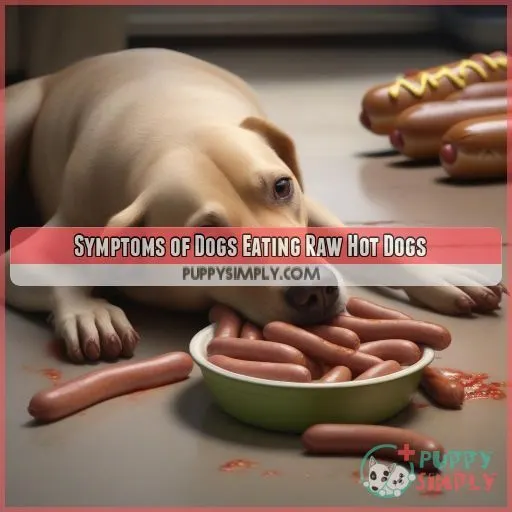This site is supported by our readers. We may earn a commission, at no cost to you, if you purchase through links.
 Can dogs eat raw hot dogs? Absolutely not! It’s a big no-no for your furry friend.
Can dogs eat raw hot dogs? Absolutely not! It’s a big no-no for your furry friend.
Raw hot dogs are like a bacterial party waiting to happen, packed with nasty bugs that can make your pup sick as a dog.
Plus, they’re loaded with sodium and fat, which is a recipe for canine health disasters.
Think of it this way: would you munch on a raw hot dog? Exactly! Your pooch deserves better.
Stick to dog-friendly treats or, if you must share, cook that hot dog thoroughly.
But remember, even cooked hot dogs aren’t ideal for dogs.
There’s a whole world of safer, healthier snacks out there that’ll make your dog’s tail wag with delight.
Table Of Contents
- Key Takeaways
- Can Dogs Eat Raw Hot Dogs?
- Dangers of Raw Hot Dogs for Dogs
- Symptoms of Dogs Eating Raw Hot Dogs
- Safe Alternatives to Raw Hot Dogs for Dogs
- Cooked Vs. Raw Hot Dogs for Dogs
- Long-term Effects of Dogs Eating Raw Hot Dogs
- Frequently Asked Questions (FAQs)
- Can dogs eat uncooked hot dogs?
- What happens if a dog eats hot dogs?
- Do you have to cook hot dogs before giving to a dog?
- Do hot dogs need to be cooked to eat?
- How many raw hot dogs can a dog safely eat?
- Can puppies eat raw hot dogs?
- Are turkey or chicken hot dogs safer for dogs?
- How long after eating raw hot dogs should symptoms appear?
- Can raw hot dogs cause food allergies in dogs?
- Conclusion
Key Takeaways
- Raw hot dogs are a big no-no for dogs: They might look like a fun treat, but they’re a bacterial party waiting to happen. Think of them as tiny ticking time bombs for your pup’s tummy.
- Nutritional nightmare: These sausages are like doggy junk food, packed with unhealthy fats and sky-high sodium. Your furry friend doesn’t need a greasy burger in disguise!
- Potential choking hazards: Picture your dog scarfing down a slippery hot dog like it’s a tasty bone – yikes! Always supervise and opt for safer, dog-friendly snacks to keep tails wagging.
- Better treats await: Instead of risking your pup’s health with raw hot dogs, explore healthier options. From sweet potato chews to peanut butter biscuits, there’s a buffet of safe snacks that won’t turn your dog into a canine couch potato.
Can Dogs Eat Raw Hot Dogs?
You might think tossing your pup a raw hot dog is a harmless treat, but hold on to your leash! Let’s uncover the surprising dangers lurking in those uncooked sausages and find out why raw hot dogs could be a recipe for canine disaster.
Risks of Feeding Raw Hot Dogs
You might think tossing your pup a raw hot dog is harmless, but hold your horses! It’s like playing Russian roulette with your furry friend’s health. From sodium overload to toxic additives, these seemingly innocent snacks pack a punch that could knock your dog’s well-being off its feet. Let’s dig deeper.
Bacterial Contamination in Uncooked Hot Dogs
You might think raw hot dogs are a tasty treat for your furry friend, but hold your horses! These uncooked snacks can be a bacterial breeding ground. Here’s why you should think twice:
- Salmonella: The silent gut-wrecker
- E. coli: The stomach’s worst nightmare
- Listeria: The sneaky invader
Don’t let your pup play Russian roulette with food safety!
Nutritional Concerns for Dogs
Raw hot dogs aren’t just a bacterial minefield; they’re a nutritional nightmare for your furry friend. Packed with unhealthy fats, sky-high sodium, and artificial flavors, they’re like junk food on steroids for dogs. These processed treats can wreak havoc on your pup’s energy level and even contribute to high blood pressure.
Potential Choking Hazards
Beyond nutrition, there’s another hot dog hazard that’ll make your tail curl. Imagine this: your furry friend gulping down a whole wiener like it’s going out of style. Yikes! Those slippery sausages can be a real pain in the neck – literally. Always supervise and consider safer, dog-friendly alternatives to keep tails wagging.
Dangers of Raw Hot Dogs for Dogs
You might think tossing your pup a raw hot dog is a harmless treat, but it’s actually a recipe for disaster. Raw hot dogs can pose serious health risks to your furry friend, from nasty bacterial infections to potential pancreatitis.
Foodborne Illnesses From Raw Meat
Raw hot dogs? Hold your horses! Your furry friend’s in for a world of trouble. Raw meat’s a breeding ground for nasty bugs that’ll have your pup singing the blues. Here’s what you’re up against:
- Salmonella: The tummy troublemaker
- E. coli: The gut-wrenching menace
- Listeria: The sneaky invader
Don’t let these party poopers crash your dog’s day!
High Sodium Content and Dehydration
Beyond bacteria, raw hot dogs pack a salty punch that’ll leave your pup parched. Picture Fido lapping up water like he’s in the Sahara! High sodium can throw off his electrolyte balance faster than you can say "hydration station." Keep an eye out for excessive thirst and urination – they’re red flags for canine dehydration.
Excessive Fat Leading to Pancreatitis
You’ve heard about the salt, but there’s another silent threat lurking in raw hot dogs: fat. Your furry friend’s pancreas isn’t built for such fatty feasts. Too much can trigger pancreatitis, a painful inflammation that’ll have your pup feeling ruff. It’s like giving them a greasy burger every day – not a recipe for tail-wagging health!
Harmful Additives and Preservatives
Beyond bacterial risks, raw hot dogs pack a punch of harmful additives. You’d be shocked at the chemical cocktail lurking inside:
- Xylitol that’ll make your pup’s blood sugar plummet
- MSG that’ll leave them feeling woozy
- Sodium nitrate that’s a real gut-buster
- Onion powder that’s a canine kryptonite
These preservatives aren’t just bad news—they’re a recipe for disaster!
Symptoms of Dogs Eating Raw Hot Dogs
If your furry friend’s gotten their paws on some raw hot dogs, you’ll want to watch out for these telltale signs of trouble. From tummy troubles to concerning changes in behavior, knowing what symptoms to look for can help you act fast if your pup’s snack turns sour.
Gastrointestinal Upset and Vomiting
You’ve seen the dangers, but how do you know if your pup’s in trouble? Watch out for gastrointestinal upset and vomiting. If Fido’s turning his nose up at peanut butter or looking green around the gills, it’s a red flag. Keep an eye on his gum color too—pale gums can indicate a serious problem.
Diarrhea and Dehydration
Diarrhea’s no picnic for pups, and dehydration can quickly become a real doggy dilemma. If your furry friend’s eaten raw hot dogs, watch for:
- Frequent, watery stools
- Excessive thirst
- Dry, tacky gums
- Sunken eyes
Don’t let your pooch turn into a canine raisin! Home remedies can help, but when in doubt, call the vet.
Lethargy and Weakness
If your furry friend’s usual zoomies turn into couch potato mode after scarfing down raw hot dogs, it’s a red flag. You might notice your pup struggling to get up or lacking their usual pep. Don’t brush it off—lethargy and weakness can signal serious issues. Time for a vet check-up, pronto!
Abdominal Pain and Bloating
Your furry friend’s tummy might be telling a tale of woe after scarfing down raw hot dogs. Watch for signs of abdominal discomfort – your pup might look like they’ve swallowed a balloon! If they’re whimpering or refusing belly rubs, it’s time to ring up the vet. Don’t let bloating burst your bubble of canine contentment!
Safe Alternatives to Raw Hot Dogs for Dogs
You might be tempted to toss your pup a raw hot dog, but there are much safer and healthier options out there. Let’s explore some tasty alternatives that’ll have your furry friend’s tail wagging without the risks.
Healthy Dog-specific Treats and Snacks
Treat your furry friend right! Instead of risky raw hot dogs, opt for healthy dog-specific snacks. You’ll find a treasure trove of options, from dental chews to allergy-friendly treats. Commercial brands offer natural ingredients that’ll make your pup’s tail wag. Remember, moderation is key – even with the good stuff!
Homemade Dog-friendly Recipes
You’ve got the scoop on healthy dog treats, but let’s cook up some tail-wagging homemade recipes! Your pup will be howling with joy over these tasty alternatives:
- Baked sweet potato chews
- Frozen yogurt and fruit pops
- Peanut butter and pumpkin biscuits
- Chicken and rice balls
-
Carrot and apple "pupcakes"
These easy-to-make snacks are pawsitively delicious!
Low-sodium and Low-fat Options
| Treat | Sodium | Fat |
|---|---|---|
| Carrot sticks | Low | Low |
| Apple slices | Low | Low |
| Lean chicken | Low | Moderate |
| Sweet potato | Low | Low |
These treats will keep your pup’s tail wagging without the health risks!
Portion Control and Moderation
When it comes to treating your furry friend, moderation is key. Stick to these guidelines to keep your pup healthy:
- Limit treats to 10% of daily calories
- Break larger treats into smaller pieces
- Use a portioned snacking schedule
- Adjust meal sizes on treat-heavy days
Cooked Vs. Raw Hot Dogs for Dogs
You might think tossing your pup a raw hot dog is a harmless treat, but hold onto your leash! Let’s explore why cooking those dogs isn’t just for humans and how you can keep your furry friend safe while still indulging their taste for savory snacks.
Cooking Methods to Reduce Risks
Your pup’s safety comes first! While raw hot dogs are a no-go, cooking them can reduce risks. Here’s a quick guide to hot dog prep methods:
| Method | Safety Level | Taste Appeal |
|---|---|---|
| Boiling | High | Low |
| Grilling | Medium | High |
| Microwaving | Medium | Medium |
Nutritional Differences Between Cooked and Raw
While cooking hot dogs reduces bacterial risks, it also changes their nutritional profile. Cooked hot dogs have slightly less fat and sodium than raw ones, but they’re still not ideal for your pup. Heat can also decrease some vitamins and minerals.
Here’s why your dog might prefer cooked hot dogs:
- They smell irresistible (like a backyard BBQ!)
- The texture is easier to chew
- They’re warm and comforting
- No slimy raw meat feeling
Proper Preparation and Serving Techniques
Serving hot dogs to your furry friend? Hold your horses! Let’s talk proper prep. While raw hot dogs are a no-go, cooking them right can make all the difference. Here’s a quick guide to keep your pup’s tail wagging:
| Method | Safety Level | Taste Factor |
|---|---|---|
| Boiling | High | Meh |
| Grilling | Medium | Yum! |
| Microwaving | Low | Bleh |
| Raw | Danger Zone | N/A |
Recommended Portion Sizes for Dogs
Now that you know how to prepare hot dogs safely, let’s talk portions. Your pup’s waistline matters! A Chihuahua can’t chow down like a Great Dane. Consider your dog’s weight, breed size, and age when dishing out treats. Remember, even cooked hot dogs should be an occasional snack, not a daily feast.
Long-term Effects of Dogs Eating Raw Hot Dogs
You might think tossing your pup a raw hot dog is harmless, but the long-term effects can be serious. From chronic health issues to obesity and nutritional imbalances, feeding your furry friend raw hot dogs could lead to a dog-gone disaster.
Potential for Chronic Health Issues
The long-term effects of feeding your pup raw hot dogs can be a real doggie nightmare. You’re not just risking a tummy ache; you’re potentially opening Pandora’s box of chronic health issues. From pancreatitis to kidney disease, these processed treats can wreak havoc on your furry friend’s body over time.
Impact on Weight and Obesity
Chronic health issues aren’t the only concern regarding raw hot dogs. Let’s talk about your pup’s waistline! Feeding these calorie-dense treats can quickly lead to weight gain and obesity. Here’s why you should think twice:
- They’re like doggy donuts – all calories, no nutrition
- Portion control? What’s that?
- Your fur baby might develop a taste for junk food
- Extra pounds can lead to joint problems and reduced playtime
Nutritional Imbalances and Deficiencies
Beyond weight gain, feeding your pup raw hot dogs can lead to serious nutritional imbalances. It’s like trying to survive on junk food – your furry friend might miss out on essential vitamins and minerals. This can weaken their immune system, affect bone health, and even impact their coat’s shine. Don’t let your pooch become a hot dog nutritional disaster!
Behavioral Changes Related to Diet
Feeding your pup raw hot dogs can lead to some surprising behavioral changes. You might notice diet-induced anxiety or food aggression as your furry friend becomes fixated on these tasty treats. Picky eating and weight gain could follow, throwing a wrench in your training efforts. Remember, the best treats are healthy ones that keep tails wagging!
Frequently Asked Questions (FAQs)
Can dogs eat uncooked hot dogs?
Imagine a dog as a ship sailing treacherous waters. Uncooked hot dogs are like hidden reefs, potentially harmful. You shouldn’t feed them raw hot dogs. They’re a bacterial buffet that could make your furry first mate sick.
What happens if a dog eats hot dogs?
If your pup sneaks a hot dog, don’t panic! They might experience tummy trouble like vomiting or diarrhea. Keep an eye on them and offer water. If symptoms persist or worsen, it’s time to ring the vet.
Do you have to cook hot dogs before giving to a dog?
Picture a sizzling hot dog, tempting your pup. You’d better cook it! Raw hot dogs can harbor bacteria, making your furry friend sick. Always cook ’em thoroughly before sharing—it’s a doggone good idea for your pooch’s safety.
Do hot dogs need to be cooked to eat?
Yes, you should cook hot dogs before eating them. While they’re pre-cooked, heating them kills any lingering bacteria. It’s like giving your taste buds a warm hug while keeping your tummy safe. Don’t risk it, cook it!
How many raw hot dogs can a dog safely eat?
Treat raw hot dogs like a ticking time bomb for your pup. While they’re not toxic, it’s best to avoid them entirely. You’re playing with fire if you feed your dog any raw hot dogs.
Can puppies eat raw hot dogs?
You shouldn’t feed puppies raw hot dogs. They’re a choking hazard and can harbor harmful bacteria. Plus, the high fat and sodium content isn’t puppy-friendly. Stick to specially formulated puppy food for your furry friend’s health and safety.
Are turkey or chicken hot dogs safer for dogs?
Picture your pup eyeing that glistening hot dog. While turkey or chicken varieties might seem healthier, they’re still not ideal. You’re barking up the wrong tree if you think they’re safe. Stick to dog-approved treats instead.
How long after eating raw hot dogs should symptoms appear?
You’ll likely see symptoms within 6-24 hours if your pup’s stomach isn’t happy with those raw wieners. Keep an eye out for the "hot dog trot" – aka diarrhea – or the "frankfurter flip" – vomiting!
Can raw hot dogs cause food allergies in dogs?
While rare, raw hot dogs could trigger food allergies in your pup. They’re more likely to cause tummy trouble than allergies, though. If you’re worried, stick to dog-friendly treats instead—your furry friend will thank you!
Conclusion
Think of raw hot dogs as the disco fever of digestive disasters for your dog.
Just like you wouldn’t attend a disco dance-off without knowing the moves, don’t risk your pup’s health with raw hot dogs.
They can cause serious tummy troubles and long-term health issues.
So, stick to safer, nutritious treats and leave raw hot dogs in the "nope" category.
Your dog’s wagging tail will thank you for avoiding those dangerous, raw hot dog risks!











